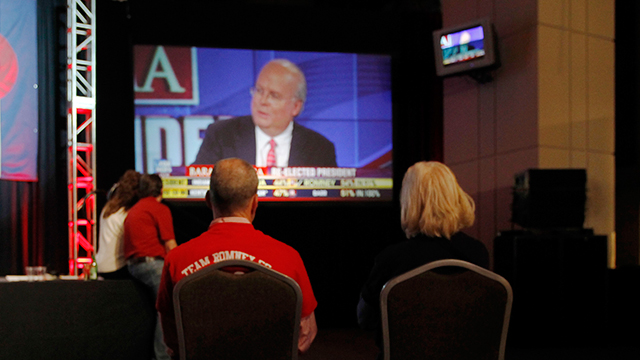
A couple sits on chairs in a near-empty room to watch Fox News commentator Karl Rove in Denver on Tuesday. (AP Photo/David Zalubowski)
The Supreme Court’s Citizens United decision infamously bestowed corporations with personhood and constitutional rights, including free speech. And during this election cycle they spoke up — a lot. But did voters listen? The answer, somewhat surprisingly, isn’t that clear cut.
We took a look today at the five most expensive races in the 2012 election cycle. In four of the five, the candidate with the most help from outside groups (political nonprofits, super PACs and party committees) did not win. The Center for Public Integrity put together a chart of the ten most expensive races for seats in the House and the Senate, and the presidential race. Of the 19 races listed in the chart (for which we know the results), 10 of the winners had more money spent on their behalf by outside groups than their opponents. That’s a 52 percent success rate. Not terrible — but not great either.
Of all politicians on the November ballot, Mitt Romney received the most money from outside groups (approximately three times as much as Obama), and did not win. The Obama campaign outspent the Romney campaign, but did it the old-fashioned way. The OpenSecrets blog team wrote on Wednesday:
President Barack Obama clinched a second term last night relying on many of the same campaign finance tools he used in his pre-Citizens United victory in 2008: party support and an in-house campaign finance operation that turned to individual donors and a web of elite bundlers to expand its reach. He received comparatively little help from outside spending groups.
But that’s not to say super PACs and secretive nonprofit groups had no influence on the election: Although they heavily favored conservative candidates, many of whom lost, they created an arms race that helped drive the cost of election to record levels.
“In reality, big money had its greatest impact and declared victory long before we tallied the votes,” said Matt Palevsky, co-founder and director of the anti-super PAC group unPAC. “All sides are forced to spend so much time begging for cash, and less time engaging in substantive debate or talking to voters.” Palevsky’s group was one of a few to fight back — they collected donations from about 400 individuals and aired a 60-second anti-PAC ad — 50 seconds of which were silent — in five Ohio markets, including Columbus, Cincinnati and Cleveland. UnPAC expects it reached over 2 million viewers.
Voters in Colorado and Montana also expressed their unease with the money in this year’s election cycle by overwhelmingly voting in favor of ballot initiatives that charged their legislators with blunting Citizens United’s impact.
But a New York Times article today suggested that PAC donors are not overly concerned about their losses, or with the growing public disgust over attack ads. Take, for example, casino magnate Sheldon Adelson, the biggest political donor in America’s history, who supported eight candidates — all of whom were defeated.
Mr. Adelson’s giving to super PACs and other outside groups came to more than $60 million, though in public Mr. Adelson did not seem overly concerned about the paltry returns on his investment.
“Paying bills,” Mr. Adelson said on Tuesday night when asked by a Norwegian reporter how he thought his donations had been spent. “That’s how you spend money. Either that or become a Jewish husband — you spend a lot of money.”
Adelson’s sentiment would indicate that, just as most voters pay monthly for electricity and water, wealthy politicos intend to put money into elections again and again, year after year. And, as Good Magazine’s Dave Burdick points out, the reprieve from attack ads for voters in swing states could be very, very brief. Midterm elections are, after all, just around the corner…

